Sometimes a kitten behaves aggressively because of constant physical pain. In all cases of sudden aggression, this should be kept in mind. The kitten should be examined for injuries, feel the belly, joints, muzzle, look into the ears. If there is an obvious reaction to touching any part of the body, you should contact the veterinarian.
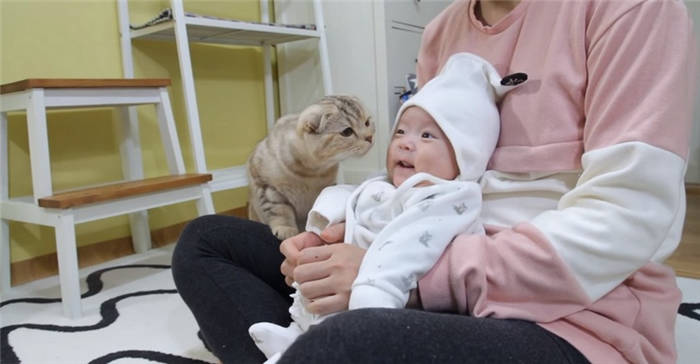
- Cat screams in baby's face
- Lack of emotional contact
- Hereditary predisposition
- Signs of feline aggression
- Passive-defensive aggression
- Offensive Aggression
- What to do if you are attacked by a cat?
- A cat has attacked and continues to be aggressive.
- Double blow for peace of mind
- Through the eyes of a cat and the eyes of a child
- Newborns
- What measures to take
- On the part of adults
- The Cat Attacks the Child
- Loud noises
- Misunderstanding of feline body language
- Don't forget about the cat
- Be present when the cat and your child interact
- Teach your child about the cat's body language and proper touching
Cat screams in baby's face
Hello. Saw a similar thread, but the situation is not quite identical. Briefly: a cat attacked a child and badly bit his face and head.
Now more details: Our cat is 8 years old. Gentry. We feed her natural food. Always was very, very shy. Especially shuns men in family (my husband and father, son 5 years old). From strangers always hides. In all 8 years we have not had a single bite or scratch from her. When my son was born, the cat was very afraid of him (noise?), probably jealous as I could no longer give her as much attention as before. She switched to other family members (started sleeping with my mom).
We did not spay her. The leaks were practically unnoticeable, besides the doctor who vaccinated her advised against it, being guided by the cat's "unproblematic" behavior during her leaks.
This year for the first time we went to the country house for a long time (3 weeks). We didn't let the cat go outside and it lived in the room where my son and I slept. Here she began to let my son pet her and even climbed on him before sleep, stroked his cheeks with her paw and hugged his neck.
The first case of aggression was when I was stroking her and my son was lying next to her, facing the cat. And then I moved over and maybe pinned her. She snarled at my son. It didn't hurt that time. I didn't pay any attention to it.
The second incident had nothing to do with attacking people, but I think it played a role: the day before the attack, she had slipped out of the house and seen some cat in the street. With a scream she rushed after it, drove it away, and returned home.
The third and saddest: the same night we went to bed, I was stroking her, she was hugging her son by the neck, but then he leaned over her and (I guess) hurt her. She screamed and started biting him in the face, I threw her off the bed and started to examine my son, because there was a lot of blood. Then she jumped out from under the bed screaming and bit his face again, and I grabbed her and threw her off me and covered my child with me; she also tried a third time, but I managed to shove her away. The husband ran in, took the screaming cat to his room, where it spent the night (very quietly). In the end, we both with very serious bites: the child's face and head bitten, I have bitten joints in my fingers. But that's not the point. There was also a fourth episode.
The cat has since (2 nights) started sleeping with my husband at night, but a day later, he brought it into our bedroom in the morning (since it's the only room isolated from the street), and we had to leave there soon. She talked nicely to me, settled down to wash, and then my son sat down on the bed (silently). She saw him, and she screamed and attacked. This time I managed to chase her away before she jumped, but she jumped out again from the other side of the bed and I managed to cover the baby with the blanket. Then we literally ran away.
My husband was completely negative to the point of "throw her the hell out" or put her to sleep. But we agreed on spaying to start with, which was done yesterday. (If we have to re-home her).
This morning she was almost out of anesthesia, sat in my arms and was very nice. In the afternoon I came to stay with her a little longer. I fed her again and lay down on the bed where we usually slept with my son. She ran as if to pet me, but stepped over me and sniffed my son's pillow, and then I was hooked. She started looking at me very intently, pupils dilated. I jumped up out of fear, and she followed me around the room, not taking her completely black eyes off me. I got the impression that she was about to attack. I'm ashamed to admit it, but I just ran away. Maybe I already thought it was aggression. And so I'm sitting here writing this post. What to do. I never thought it was possible to be afraid of your own cat! I'm on the verge of hysterics. Yes, we are going back to Moscow on Monday. Is there any hope for her to be the same in a different environment?
Lack of emotional contact
In some cases, a seemingly angry kitten turns out to be a frightened toddler who does not feel safe. Aggression as a manifestation of mistrust is quite common, and therefore it is important that there is a strong emotional connection between family members and the kitten. If the kitten constantly bites and scratches when you try to pet him, take him in your arms or just walk by, look closely – most likely, the baby is unsure of his friends around him.
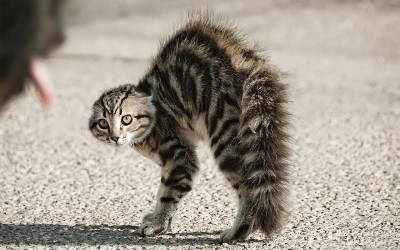
Confidence may be lost or not yet gained. In the first case, the kitten may have been "offended" by the rough treatment (forcibly twisted and clawed). Well, how to trust such vicious? In the second – the baby is not yet accustomed to the new environment. Caution is a normal reaction to change. What to do if the kitten is aggressive from fear and uncertainty? You need to give him time and surround him with unobtrusive care. If he doesn't want to play – let him sleep, he will come himself when he is bored. Does not want to communicate – let him have fun himself. Over time, the baby will definitely get used to contact, the main thing is not to ignore timid attempts to communicate. If the kitten scratches and bites when the owner wants to take him in his arms, and at other times behaves quietly, do not unnecessarily disturb the baby, let him observe the life of a friendly family from the side.
Hereditary predisposition
It happens that the kitten is constantly biting and scratching, despite the correct behavior of the owners. I think we took everything into account: we gave him enough time, we don't play with his hands, all manipulation is only through caressing and persuasion. Probably, it is a hereditary predisposition to aggressive behavior. If one parent is aggressive by nature, the baby could easily inherit a "hard" character. In this case, to re-educate the kitten will be very difficult. Action can only be taken with persuasion and affection.
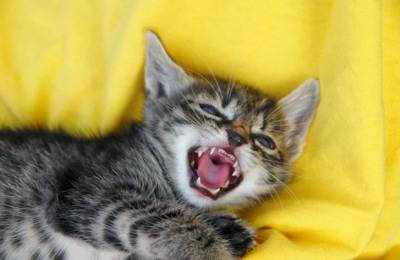
Often a person picks up a kitten on the street, and then wonders: "Why does the kitten bite and scratch, because I surrounded him with care and probably saved him from starvation. You have to wonder about the degree of domestication, since many street-born kittens are wild animals. The mother cat aggravates the situation by attacking any creature approaching the den, while the baby is watching and learning.
When choosing a kitten, you should "communicate" with the mother: if the cat hisses, scratches and does not let a person near the baby, there is a high probability that the kittens will grow up aggressive.
Signs of feline aggression
Regardless of the type of aggression, a cat that is about to attack will give one or more behavioral signals:
- Ears pressed tightly against the head.
- Sharp waving of the tail – the cat sort of whips itself on its sides.
- The tail is tense, slightly curved.
- Concentrated, fixed in one point gaze.
- The hind limbs are half-bent, the movements are creeping.
- Mouth ajar, hissing, sounds combining hiss and something like sneezing.
Passive-defensive aggression
Statistics show that most cats attack people and other animals in an attempt to defend themselves. Before an attack, the cat makes it clear that it should be left alone:
- The limbs are tense, straight, and the cat sort of stands up on its toes.
- The back is arched.
- The tail is elevated at the base, curved, downward, the tip methodically twitching.
- The ears are pressed against the head or drooped on the sides.
- The cat may hiss, meow threateningly, or simply open its mouth.
- The hair from the withers line to the tip of the tail is up.
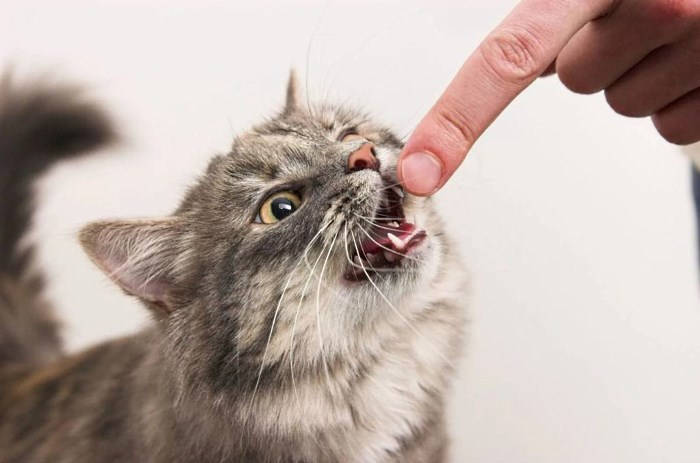
The above posture indicates that the cat is afraid and does not want to get into a fight. The best thing you can do if the cat has taken a passive-defensive stance is to leave it alone for 10-15 minutes.
Offensive Aggression
Signs of offensive aggression appear when the cat is determined to attack:
- Eye-to-eye gaze, fixed head position.
- Confident movement toward the object of attack.
- Tail straight, lowered to the ground.
- Ears raised, slightly tilted forward.
- The back is slightly arched, tense.
- The cat may hiss or growl.
- The coat from the withers line to the tip of the tail is up.
Many people confuse passive-defensive and offensive aggression. The main difference is the cat's trajectory. When an animal is defensive, it freezes in place or tries to retreat, while during offensive aggression the cat confidently walks forward.
What to do if you are attacked by a cat?
Naturally, precautions depend on whether you were attacked by an outdoor cat or an indoor cat. If you are attacked by an outdoor cat, be sure to seek medical attention! Street animals prefer to avoid confrontation with people. If a cat has attacked, there is a good chance that it is infected with the rabies virus.
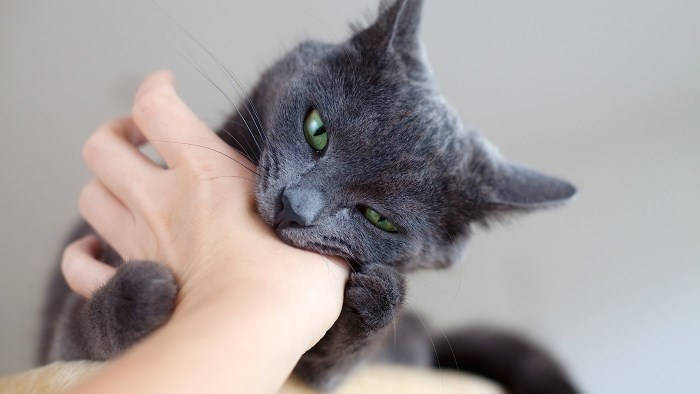
The scratch should be treated with antiseptic as soon as possible. The condition of the injured skin should be monitored for 3-4 hours. If the injured area is heavily swollen, you have a fever or you feel very sick, be sure to consult a doctor.
The bite should be treated as soon as possible with an antiseptic agent. If possible, do not let a clot form at the puncture point. The longer it takes to bleed, the more likely you are to avoid further inflammation.
If the cat has bitten your arm or leg, it is better to soak the injured limb in a solution:
If a domestic cat has easy access to the outdoors and is not vaccinated against rabies, you should seek medical attention as soon as possible if bitten.
A cat has attacked and continues to be aggressive.
Three days ago, our pet cat attacked me. We have already found a thousand excuses why our cute furry creature has turned into a wild monster, but it does not improve the situation much.
The cat is five years old.
Not purebred, color blue, like chartreuse.
Completely domesticated, does not go out on the street at all, even outside the door afraid to go out.
Three years ago he was neutered. By the way, just after the first attack, we also came back from vacation a couple of days ago. Something stirred him up and he threw himself at my feet, grabbed him, and then jumped away. This was an isolated incident, and now if we go somewhere, then the first few days after arrival I try not to touch the cat until he comes to himself.
We feed the cat dried food, liquid food, cooked fish without bones, liver, and boiled eggs. Usually we leave it for the night and in the morning if he asks for it, and during the day – dry food.
The tray two, both are in the toilet, one he goes to the toilet on the big, in another in a small, change immediately as noticed, otherwise go look for another place to use the toilet.
We play a day, maybe an hour or an hour and a half. Likes to run after the shoelace, at one go it lasts about 10 minutes, then he either just lies down or takes the shoelace away when he wants to play and brings it back. We play with him mostly by myself or my husband. He likes to play with things that are light and bounce well: hollow balls, bags.
There are no other animals, there are four of us: my husband and I, my mother-in-law and a cat. Most of all he is with his mother-in-law, he sees her most often, if she is not there he goes to our room, he can sit with me all day, he sees my husband less often, but he can spend weekends on his shoulder.
It was the second day we came back from vacation, I washed all the things that we took with us, just took them off and brought them into the room to unpack, put them on the bed. The cat was clearly in a bad mood, started circling around and around the bed and howling as if he wanted something, then started scratching the bed as if he was planning to put a toilet in there. I yelled at him a couple of times, he would leave, but then come back and howl and scratch again. Then I drove him off, and I remember his pupils got big and black (the kind you get when he's very interested in catching a shoelace). He made a circle around the bed, crawled under it. and then jumped out (with a scream/snarl – I don't remember) and clawed at my hand, then the other. I was able to chase it away with something I could find, sat next to it for a long time, all disheveled, then crawled away under the bed, and I was afraid to move for a long time yet.
Called the vet, he injected the cat sedative, said to buy drops "Lullaby" and add to food or drink – and did so.
The result: I go to the dressing for three days, the cat – on sedatives (I, incidentally, too). I try not to cross paths with him, I leave the house with everyone else, I come when someone else is home, I lock myself in my room (the scene of the battle). My family says that if I don't have contact with him, he will wean himself off of me altogether and it will get worse. But he hissed at my husband when he came into our room, hissed at me a couple of times, and once hissed and pawed my mother-in-law.
He eats, pats, even plays, and then suddenly becomes wary, scared, and tries to run away somewhere.
For my part, I can say that at the sight of him I get alarmed, and if he hisses, I start to panic.
If he is locked in another room so that I can safely use the bathroom, kitchen, or toilet, of course he tries to "break the door.
How do I behave? What to do with the cat?
Double blow for peace of mind
Cats are wonderful pets, bringing comfort, warmth and tenderness to the family. Children are our everything, our future and the meaning of our lives. But they both are a huge responsibility and a lot of inconveniences and responsibilities, albeit pleasant, that disturb the measured flow of life. A cat in the house and a child – it's always an additional headache, you must be prepared for this in advance. Friendship between children and animals – a wonderful phenomenon, bringing up in the baby tolerance, care and a lot of other qualities of a real person. But adult family members must understand that friendship does not occur in an instant. For a kitten and a baby in the house to become buddies, it takes time, throughout which adults must help both parties find common ground.
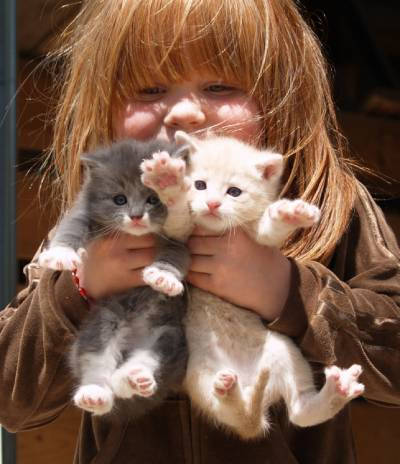
The most unfortunate combination is an infant and a cat, especially if the pet is very young or at an advanced age. This does not mean that you have to get rid of the cat when the baby arrives! Everything will work out if you put a little effort into it. But to have a cat when the family is growing up should not be: a kitten and a child in the house – too much work, even for the most loving and attentive mother. It is better to wait until the baby is at least three years old, at this age the child already understands the meaning of the words "bad" and "good".
Through the eyes of a cat and the eyes of a child
Zoopsychologists name three main reasons why small children and cats cannot find a common language: fear, jealousy and protection of the territory. Whatever the reason for starting a war campaign, love and patience should be the basis for dealing with the problem, even if the cat attacked the child for no apparent reason or if the child hit the cat for seemingly no reason. However, it is important to get to the root cause so you know what direction to take.
Understanding why cats are afraid of children is not that difficult. Babies are noisy, fussy, unpredictable and flighty creatures. A cat likes peace and quiet, appreciates privacy and respects the observance of boundaries in communication. Not every pet is happy when a stranger wants to pat its ear. What to say about a child who, despite all the signals, stubbornly does not want to give up! If a domestic cat has bitten a child, it was probably, before anything was done, stubbornly letting the child know that it did not want close contact: flattening its ears, fluffing its whiskers, flashing its eyes and banging its tail on the floor. But all patience comes to an end, and teeth come in.

The baby, having "met" teeth or claws for the first time, remembers the lesson for a long time. Now the cat is not a fun, battery-operated stuffed toy, but something vicious and dangerous, capable of causing pain. In some cases, the child tortures the cat consciously, taking revenge on it for its unwillingness to communicate and remembering the bite or scratches. This is when fear takes an aggressive form: the best defense is an attack. This can also include a defensive reaction when a child hits a cat with a bucket just because it is approaching him or her. Perhaps the pet is interested in the squeaker or wants affection, but a long time ago the cat scratched the child and he remembers it very well.
In this case it is important to explain to the child why the cat attacks. Tell about the pain caused by the baby's careless movements. Be sure to explain that the cat is also a member of the family, that we love it too, because it protects our home from the cheeky mice who would certainly take away your candy and toys, if it were not for the cat. And she is very brave and strong: "Remember how it hurt when she scratched you? No mouse would go through!".
Newborns
It is not uncommon for parents to encounter the first episode of this behavior on the part of the pet while the pet is still newborn. This is due to the following reactions of the pet:
- Jealousy. Recently, the family's main pet was a cat, and now all attention is focused on some new person. Resentment overwhelms and causes not the warmest attitude, the new family member is a competitor for the owners' attention, so the cat hisses and demonstrates all the emotions that overwhelm the cat's heart.
- Boredom. Lack of attention, lack of communication and play can make an animal bored. The situation is aggravated if they forget to clean her litter box, feed her on the old schedule. Just as children attract the attention of their parents with not the best behavior, cats can use this extremely effective method of hissing or attacking the baby. A response is guaranteed, and it is better for the socially bored animal than oblivion.
- Territorial Claims. Cats react differently to newcomers in their territory, whether it's another cat, a dog, or a new family member. Those of them who actively chase away strangers may also try to chase away a newborn, showing him in different ways who the real boss is. Hissing and attacking can also go a long way.
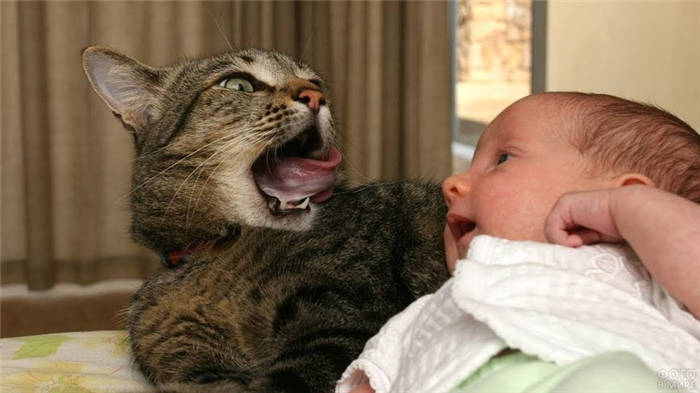
All of these cases are easily corrected with the right response from the owners.
With older children, there can be just as many problems. Reasons for a pet hissing or even attacking can be
- Too loud.. In the wild, loud noises always cause alarm. They accompany natural disasters, an attack by predators, mortal danger, a moment of death or severe pain. Despite the fact that there can be no predators or hurricanes in the house or apartment, the animal follows its natural instincts. Children often scream, laugh loudly, cry, jump, and the pet perceives this as an alarm signal that forces them to defend themselves. Even loving parents lose their temper after hours of loud "marathons," much less an animal whose hearing is much thinner and more sensitive than human.
- Rudeness. Babies do not know how to control the force of pressure and pressure sufficiently. Sometimes they can hurt beyond their will. They may try to pet the cat, trying to imitate adults, but do so through excessive force and intensity. With the same over-enthusiasm, they may take the pet in their arms and press it against them, thereby making it hurt or unpleasant. Body parts that people don't have usually arouse immoderate curiosity. The baby can pull the whiskers, lift the tail, check how firmly the ears are "attached" and whether they can be separated, like a construction set. It is clear that all these actions will be perceived as an attack.
- Illness. If this has never happened before, and suddenly the cat began to throw or hiss at children, it may be due to the fact that the animal has something in pain. Pain in such cases is exacerbated by improper handling or even loud noises.
- Hormonal malfunction. Specialists sometimes note that females who are not littered may fall under hormonal attack if they have not been spayed. They sometimes have increased aggression toward strangers.
- Ignoring "hints." Most cats, before attacking a child, try for a long time to express their displeasure by other methods – body language. Among this species, they are easy to read and can be equated with the phrase "You don't have to do that, I don't like it. If they are not responded to, then after a while the animal will lose its temper and show that it is not allowed to behave that way with it.
- Offspring. The female gets very anxious if there is a heightened interest in her offspring, and the reaction to kittens is very violent when they are babies. This can cause fear and a defensive reaction on the part of the mother.
What measures to take
Experts believe that the problem should be approached comprehensively. Simple and effective tips on what to do if the cat hisses, throws or attacks the child will come in handy.
On the part of adults
Knowing the nature and behavior of the pet makes it easier to bond with the new family member. To make it as quick and easy as possible, you need to pay attention to the following points.
Representatives of the feline genus have so-called play aggression. Predators by nature, they need to exercise their instincts, but in the home there is only one way to do this – play. If the owners don't take care that the cat has toys and doesn't play with it from time to time, they themselves are to blame for the aggression that has appeared.
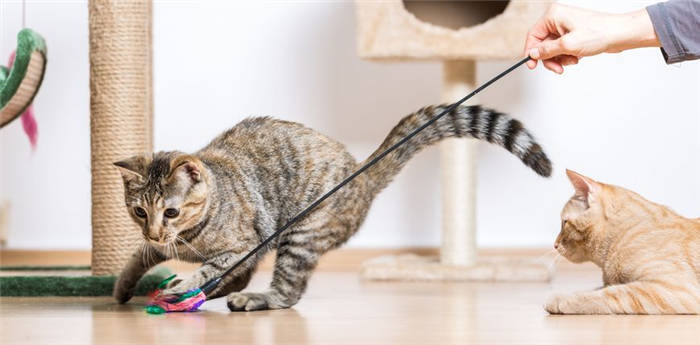
Such a neglected cat will find any opportunity to reduce play aggression, and it is likely that the object of attack will be a running or crawling baby.
Communication can be non-verbal: it is enough to periodically stroke the withers, you can simply put your hand on the side if the cat is lying nearby. You should be careful, because many animals do not like it when their belly is touched and they hiss. Daily attention will allow the pet to feel like a full-fledged member of the family who is loved. It takes some time, you just need to take it slow and let it adjust to its new environment.
It is the adults who are responsible for the relationship between the daughter or son and the cat; they must teach the youngest member of the family to behave properly. The first time they should not be left unsupervised, because both parties may act unpredictably. Being on guard is the only correct tactic for a few weeks.
For the safety of the whole family and the pet, you need to give him a place where he can be left alone when he gets bored with human companionship. The baby needs to be explained that sometimes the animal needs solitude just as much as food or sleep, and you can't insist on playing further at this time. It is forbidden to take the "fugitive" out of there by force. When the time comes, he will come out to people himself.
The Cat Attacks the Child
Bought a cat. Breed British. boy. Took two-month old kitten. On the sixth month, began to attack the child who is playing and the cat himself does not approach. Punishment of the cat does not help. I'm thinking of putting him to sleep.
Hello! Describe the situation in more detail. How old is the child, how does the cat attack, maybe he is playing this way? Is the cat neutered? Perhaps he is just trying to take a step up in your pride, trying his strength? How do you punish the cat? Not a lot of information.
I would try to go to the clinic for a consultation, talk to the vets, maybe they can give you some good advice, they know about animal psychology even a little bit. You can always put a baby to sleep.
The child is seven years old. She ambushes him, as if she were hunting. The scratches and teeth bites are too severe for games. The child is always crying and frightened. We punish him as usual, slap his hands on his ass and show him what he's done and lock him in the living room for the night. The cat himself is affectionate, comes to purr often and to the baby. But at some points it is as if he was replaced. No, not yet neutered. Maybe this is the problem and neutered he will be docile?
The cat himself is still a child, and he begins puberty.them at this time as if they are substituted) neuter the cat and there will be happiness to all:-)
First you need to understand that punishment with the hands gives the cat a sign – the hands should be attacked, they are bad. Punish – with a soft slipper, a squirt of water, a broom – but not hands. Secondly, the cat needs toys – climbing toys, balls, mice, teasers. Give your child a toy – teach him to entertain the cat, then he will not be interested in hunting him. Thirdly, the cat needs to be kitten proofed. I have three cats, tapka know like the peeled off, no one hands and feet do not even think of touching.
Yes, better on AVito, do not have to put to sleep, a bunch of people dream of such an angry cat, recently here are my friends just looked for one, so that immediately take away
I will describe our situation:
When my sister and I were children, about the same age as your child, his parents got a cat (Siberian breed), took him little, but the point is not this. So the cat chose my sister as his 'victim'. he also attacked her from an ambush. and he attacked her seriously, right around her leg and gnawed. he tried it once with me and after i pardon the expression 'mauled him' he respected me and never attempted it again. Conclusion-I am convinced that this behavior can eradicate your son, he needs to put it in its place and was not afraid! Cats are very sensitive to who dominates them. And put to sleep is not necessary … try my method. and then, at the expense of neutering, perhaps help)
Loud noises
Loud children's voices are often an irritant to the cat and cause the animal to attack. Even the parents cannot bear to listen to them for hours, what about cats with their sensitive ears? A cat will attack the source of loud noises, be they crying, laughing, squealing or screaming, believing that the desired silence will prevail after its intervention.
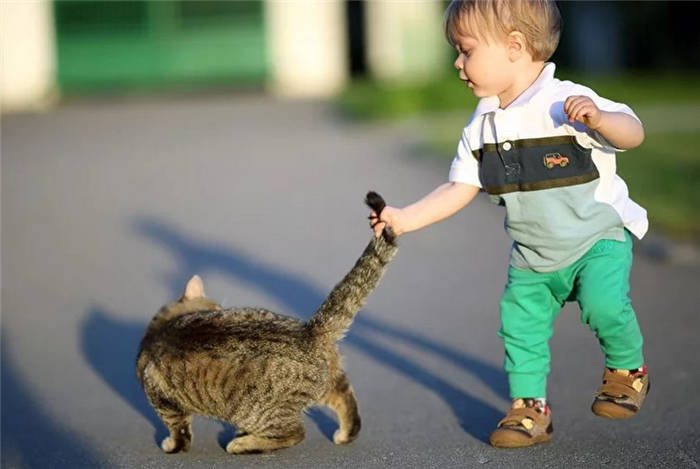
Babies under two years of age reflexively grasp everything with their hands, including cats. The idea of someone else's body as their own, that is, the ability to transfer their own feelings to other living beings, is formed in children not immediately. Soft, fluffy cats are endlessly touched and it is not surprising that children are over-zealous in their caressing.
Misunderstanding of feline body language

Here are some tips on how to prevent a cat from attacking a child.
Don't forget about the cat
Most cases of "attacks" of domestic cats on humans occur because of play aggression – the cat does not expend its energy, does not exercise its predator instincts in any way and, suffering from boredom, rushes at any moving object, whether it is the feet of the owner or a baby running around the room.
Busy young parents are easy to understand and accept, nevertheless, try not to forget about pets, spend time with them, communicate and, of course, play. An animal that feels like a full-fledged, beloved family member is unlikely to behave aggressively.
Be present when the cat and your child interact
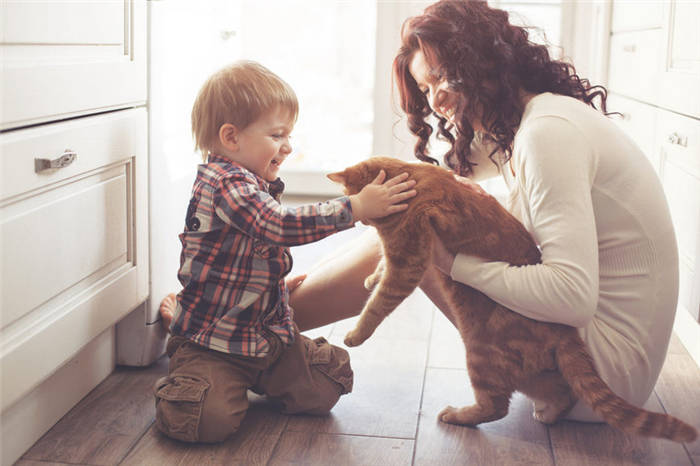
Do not leave the cat alone with your child until the baby is old enough to talk to him. Also, your presence allows you to first show and then explain to your child how to properly communicate with the animal.
Teach your child about the cat's body language and proper touching
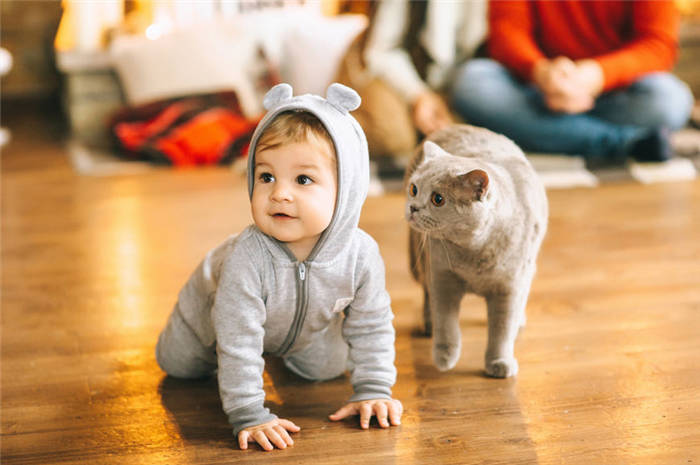
Draw the child's attention to the signs of the cat's anxiety and displeasure, when it should be let go and left alone. Show your child how to pet the cat correctly – the movements should be smooth, gentle, without pressure. Stroking should be carried out in the direction of hair growth, in the head, neck and back, but the tail, abdomen and feet should be left untouched. Also teach your child not to shout and not to make noise when the cat is near, explain that loud noises scare it.






